What’s in the Georgia Trump indictment

[ad_1]
For the fourth time in five months, former President Donald Trump has been indicted on criminal charges.
Trump and 18 other people were charged in a sweeping racketeering indictment for alleged efforts to overturn the results of the 2020 presidential election in the state of Georgia, over more than a year.
The defendants allegedly solicited state leaders throughout the country, harassed and misled a Georgia election worker and pushed phony claims that the election was stolen, all in an effort for Trump to remain in power despite his election loss.
According to the indictment, the alleged scheme involved prominent individuals such as Trump’s former chief of staff Mark Meadows, former New York City Mayor Rudy Giuliani and attorney John Eastman.
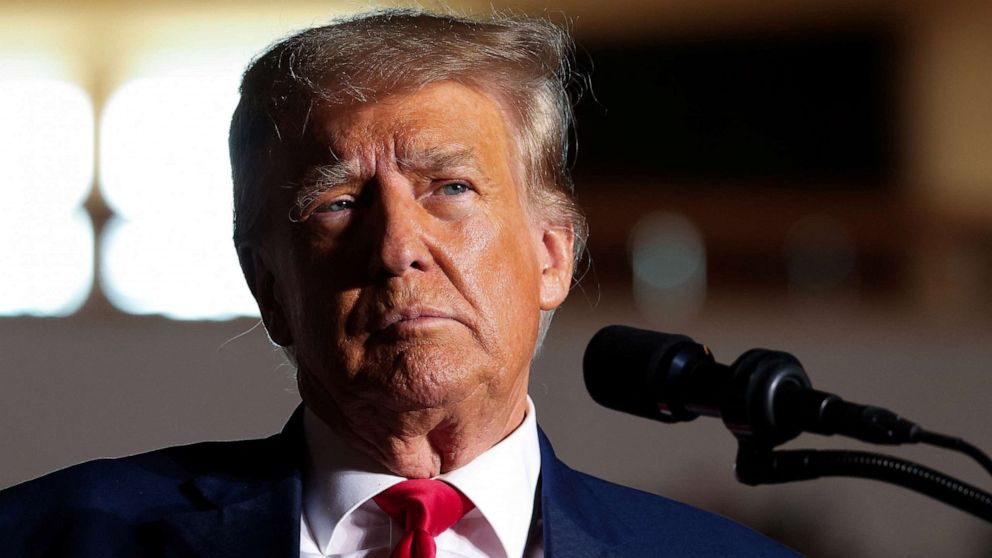
Former President and Republican presidential candidate Donald Trump reacts as he holds a campaign rally in Erie, Pa., on July 29, 2023.
Lindsay Dedario/Reuters
Trump’s campaign called the indictment “un-American and wrong” in a statement early Tuesday. The former president contends his actions were not illegal and the investigation is politically motivated. He has pleaded not guilty to his three other indictment cases, which are in New York criminal court, Florida federal court, and Washington D.C. federal court.
Guiliani released a statement early Tuesday morning echoing Trump’s campaign statement and contended the allegations are false.
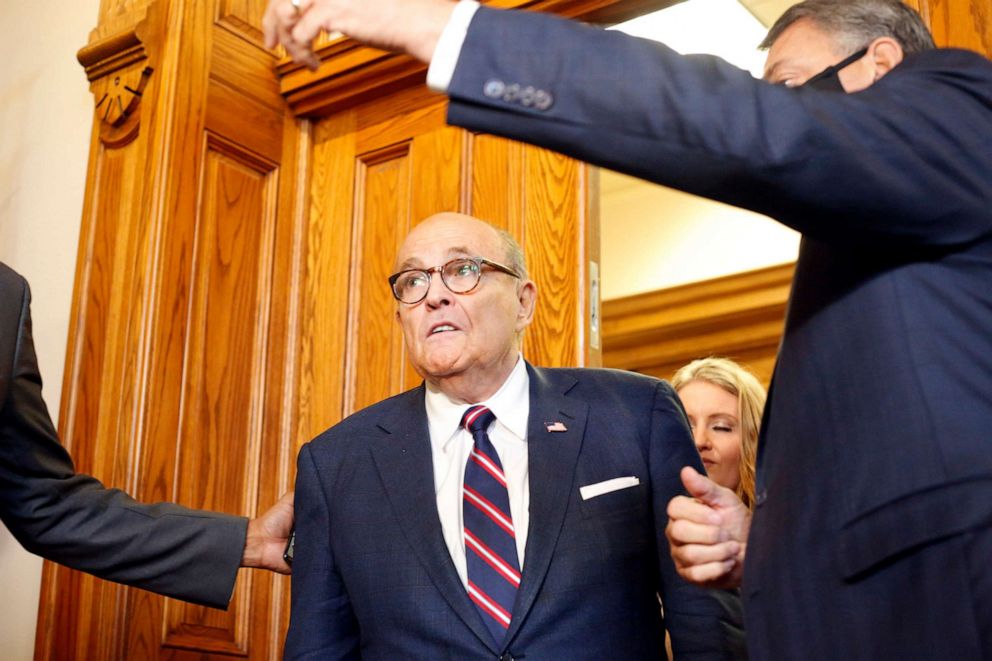
Rudy Giuliani walks to a senate hearing at the Georgia State Capitol, Dec. 3, 2020, in Atlanta.
Rebecca Wright/AP
“The real criminals here are the people who have brought this case forward both directly and indirectly,” he said in a statement.
Trump and the co-defendants were given a deadline of Aug. 25 to turn themselves in for arraignment on the charges.
Here are some of the major allegations in the 41-count indictment.
False statements to state leaders
The indictment alleges that members of the conspiracy made several false statements to the Georgia state legislature, falsely claiming there was election fraud and that they could appoint their own electors.
For example, co-defendant and Trump staff member Michael Roman instructed an individual associated with the Trump campaign to “distribute information related to the December 14, 2020 meetings of Trump presidential elector nominees in Georgia, Arizona, Michigan, Nevada, New Mexico, Pennsylvania and Wisconsin to other individuals associated with the campaign,” the indictment alleges.
The indictment specifically says that members of the conspiracy “corruptly solicited Georgia officials, including” former Georgia House Speaker John Ralston, “to violate their oaths to the Georgia Constitution and to the United State Constitution by unlawfully changing the outcome of the November 3, 2020, presidential election in favor of Donald Trump.”
On Dec. 7, 2020, Trump specifically tried to solicit Ralston to violate his oath by calling a special session of the Georgia General Assembly for the purpose of unlawfully appointing presidential electors from Georgia, according to the indictment.
The Georgia indictment also highlights efforts by Trump and Meadows to allegedly interfere with the election counting process and push their false claims.
On Dec. 22, 2020, Meadows traveled to Cobb County Center and “attempted to observe the signature match audit being performed by law enforcement officers and officials from the Georgia Secretary of State despite the fact that the process was not open to the public.” .The officials, including the Georgia Deputy Secretary of State, prevented Meadows from entering the space where the audit was being conducted.
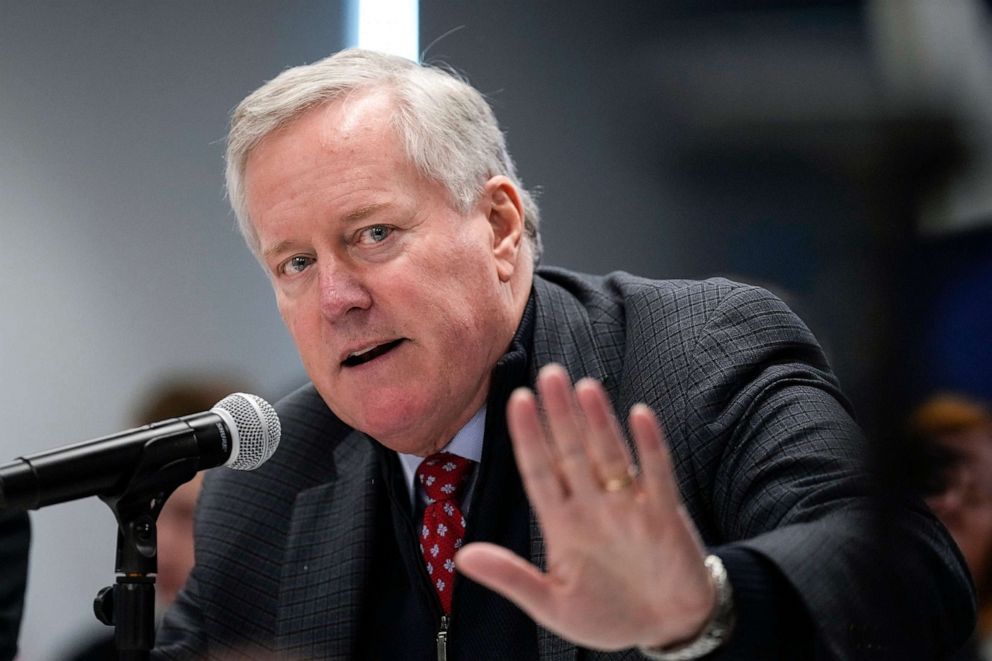
Former White House Chief of Staff during the Trump administration Mark Meadows speaks during a forum titled House Rules and Process Changes for the 118th Congress at FreedowmWorks headquarters, Nov. 14, 2022, in Washington.
Drew Angerer/Getty Images
A day later, it is alleged that Trump placed a call to the office of the Georgia Secretary of State Chief Investigator Frances Watson that had been arranged by Meadows. During the call, Trump falsely stated he had won the 2020 election by “hundreds of thousands of votes.”
Meadows texted Watson on Dec. 27 asking if she could “speed up Fulton County signature verification in order to have results before Jan. 6,” the indictment said.
Creation of false election documents
The defendants allegedly created false Electoral College documents and recruited individuals to convene and cast false Electoral College votes at the Georgia State Capitol, in Fulton County, on December 14, 2020, according to the indictment.
“The false documents were intended to disrupt and delay the joint session of Congress on January 6, 2021,” the indictment states.
The indictment contends the defendants allegedly tried to conduct similar acts in key battleground states: Arizona, Michigan, Nevada, New Mexico, Pennsylvania and Wisconsin.
Harassment and intimidation of Ruby Freeman
The indictment detailed alleged efforts to harass Georgia election worker Ruby Freeman to convince her to report election fraud claims in testimony.
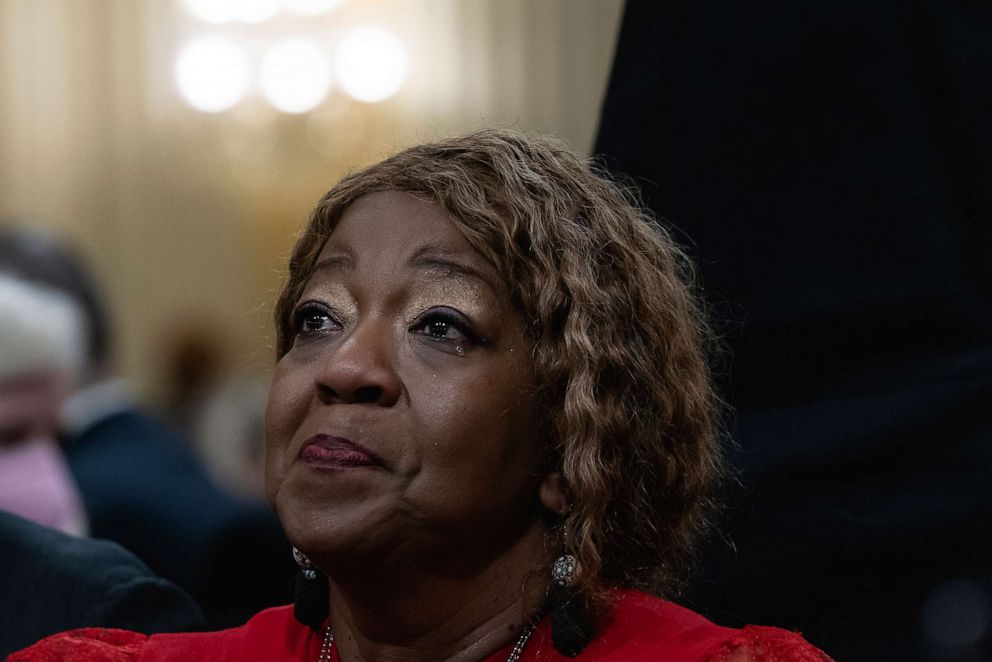
Ruby Freeman, former Georgia election worker, cries as she sits behind her daughter Wandrea ArShaye “Shaye” Moss, during the hearing of the Select Committee to Investigate the January 6th Attack on the US Capitol, June 21, 2022, in Washington.
Cheriss May/Sipa USA via AP
Giuliani and others made false claims to the Georgia House of Representatives that Freeman and her daughter Shaye Moss, who was also an election worker, sabotaged voting machines, according to the indictment.
The indictment alleges some of the defendants tried to influence Freeman’s testimony and intimidated her.
Trump associate Trevian Kutti allegedly traveled from Chicago to Georgia to speak to Freeman, the indictment alleged.

Trevian Kutti is seen, Dec. 2, 2021, in Miami.
Daniel Zuchnik/Getty Images
Kutti claimed she was there to help Freeman because she was in danger and lied to her about her intentions, according to the indictment.
Soliciting Dept. of Justice officials
Former senior Department of Justice official Jeffrey Clark, who is one of the defendants named in the indictment, allegedly made false statements in writing and in person to the Acting Attorney General and Deputy Attorney General, urging the officials to let him convey the false information to Georgia State Officials.
Clark wanted to be able to say that the Department of Justice “identified significant concerns that may have impacted the outcome of the election in multiple states, including the State of Georgia,” according to the indictment.
Clark requested authorization, both in writing and in person, to send this incorrect information to Gov. Brian Kemp, Ralston and President Pro Tempore of the Georgia Senate, Butch Mille.
Unlawful breach of election equipment
The indictment alleges that members of the group “stole data, including ballot images, voting equipment software, and personal voter information.”
Trump attorney and co-defendant Sidney Powell allegedly “entered into a written engagement” with a forensic data firm known as SullivanStricker LLC that they allege joined in an “unlawful breach of election equipment in Coffee County, Georgia.”
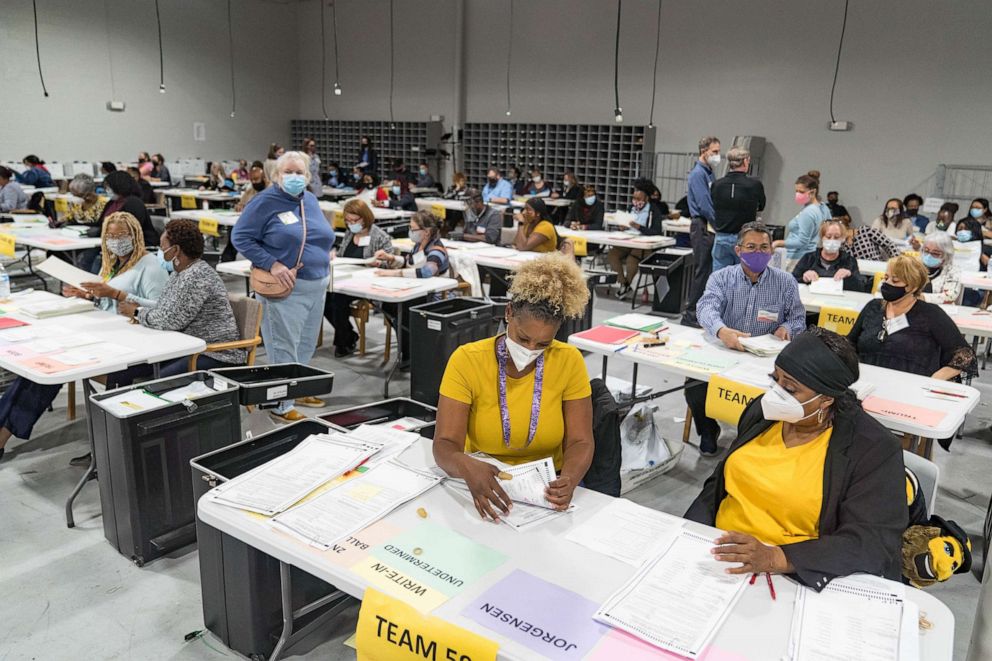
Gwinnett County election workers handle ballots as part of the recount for the 2020 presidential election at the Beauty P. Baldwin Voter Registrations and Elections Building, Nov. 16, 2020 in Lawrenceville, Ga.
Megan Varner/Getty Images
“The stolen data was then distributed to other members of the enterprise, including members in other states,” the indictment said.
ABC News’ Lucien Bruggeman contributed to this report.
[ad_2]